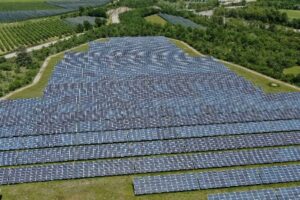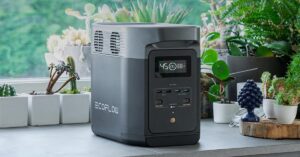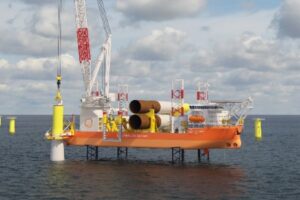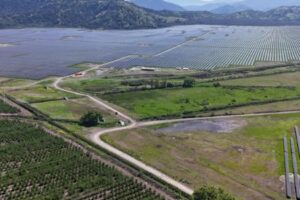Pros and Cons of Air Source Heat Pumps

In recent years, air source heat pumps (ASHPs) have gained popularity as an energy-efficient alternative for heating and cooling homes. These systems extract heat from the outdoor air and transfer it indoors during the winter months, and they can reverse this process to provide cooling during the summer. While ASHPs offer several advantages, they also come with their own set of drawbacks. In this article, we’ll explore the pros and cons of air source heat pumps to help homeowners make informed decisions about their heating and cooling needs.
Pros of Air Source Heat Pumps
Being a technology that helps us pay less on heating and cooling, we can say that air source heat pumps have more pros than cons.
1. Energy Efficiency
One of the primary benefits of air source heat pumps is their high energy efficiency. By harnessing heat from the outdoor air, ASHPs can provide heating at a fraction of the cost of traditional heating systems like furnaces or electric baseboards. This can lead to significant savings on energy bills over time.
2. Environmental Friendliness
ASHPs are considered more environmentally friendly than traditional heating systems because they rely on renewable energy sources (the heat in the outdoor air) rather than burning fossil fuels. By reducing reliance on fossil fuels, ASHPs help lower greenhouse gas emissions and mitigate climate change.
3. Versatility
Air source heat pumps offer both heating and cooling capabilities in a single system, making them versatile options for homeowners. This eliminates the need for separate heating and cooling systems, saving space and simplifying installation and maintenance.
4. Low Operating Costs
In addition to lower energy bills, air source heat pumps typically have lower operating costs compared to other heating and cooling systems. With proper maintenance, ASHPs can provide efficient and reliable performance for many years, resulting in long-term cost savings for homeowners.
5. Government Incentives
Many governments offer incentives, rebates, and tax credits to encourage the adoption of energy-efficient heating and cooling technologies like air source heat pumps. These incentives can help offset the upfront cost of purchasing and installing an ASHP, making it a more attractive option for homeowners.
Cons of Air Source Heat Pumps
Like any other technology available today, air source heat pumps have a few disadvantages.
1. Temperature Limitations
Air source heat pumps may struggle to maintain efficient heating in extremely cold climates, especially during prolonged periods of sub-zero temperatures. In such conditions, the efficiency of ASHPs decreases, leading to higher energy consumption and reduced heating capacity.
2. Initial Cost
While ASHPs offer long-term savings on energy bills, the upfront cost of purchasing and installing a system can be relatively high compared to traditional heating systems. Homeowners should consider the initial investment required and weigh it against the potential long-term savings when deciding whether to install an ASHP.
3. Noise
Air source heat pumps can generate noise during operation, particularly outdoor units. The sound produced by the compressor and fan may be noticeable, especially if the unit is located close to living spaces or neighboring properties. Proper placement and soundproofing measures can help mitigate this issue.
4. Space Requirements
ASHPs require outdoor units to be installed outside the home, typically in the yard or on the roof. Homeowners must have adequate outdoor space available for the unit’s placement, as well as proper clearance for airflow and maintenance access.
5. Performance Variability
The efficiency and performance of air source heat pumps can vary depending on factors such as outdoor temperature, humidity levels, and the size and layout of the home. In some cases, homeowners may experience fluctuations in indoor comfort or uneven heating and cooling distribution, especially in larger or multi-level homes.
6. Reliance on Electricity
Air source heat pumps rely on electricity to operate, which means they may not be suitable for areas with unreliable or expensive electricity supply. In regions where electricity prices are high or subject to frequent fluctuations, ASHPs may not offer the same level of cost savings compared to areas with more stable and affordable electricity rates.
7. Aesthetics
Some homeowners may find the outdoor units of air source heat pumps to be aesthetically unappealing, particularly if they are located prominently in the yard or on the exterior of the home. While efforts can be made to conceal or integrate the units into the landscaping or architecture, this may not always be feasible or desirable.
8. Lifespan
While air source heat pumps can provide efficient heating and cooling for many years with proper maintenance, they typically have a shorter lifespan compared to other heating systems such as boilers or furnaces. Homeowners should be prepared to replace ASHPs after 10-15 years of use, depending on factors such as usage patterns and maintenance practices.
9. Compatibility with Existing Systems
Retrofitting an existing home with an air source heat pump may require modifications to the ductwork or heating infrastructure, which can add to the overall cost and complexity of the installation process. Homeowners should consult with HVAC professionals to assess the compatibility of ASHPs with their existing heating and cooling systems before making a decision.

Air source heat pump units installed on the terrace, image source: Unsplash
10. Maintenance Needs
Like any heating and cooling system, air source heat pumps require regular maintenance to ensure optimal performance and longevity. This may include cleaning or replacing filters, checking refrigerant levels, and inspecting components for wear and tear. Homeowners should factor in ongoing maintenance costs and efforts when considering an ASHP.
Conclusion
In conclusion, air source heat pumps offer several advantages, including energy efficiency, environmental friendliness, versatility, low operating costs, and government incentives. However, they also have drawbacks such as temperature limitations, initial cost, noise, space requirements, and maintenance needs.
Homeowners should carefully weigh the pros and cons of ASHPs against their specific heating and cooling needs, climate conditions, budget, and preferences before making a decision. Consulting with HVAC professionals can also provide valuable guidance and insights to help homeowners make informed choices about air source heat pumps.







